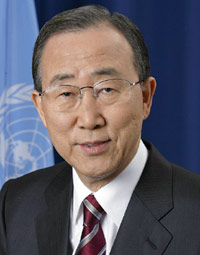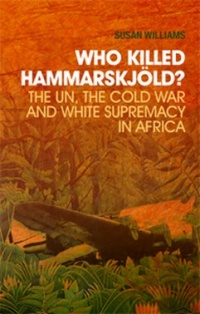Difference between revisions of "Ban Ki-moon"
m |
(template) |
||
| Line 1: | Line 1: | ||
| − | + | {{person | |
| − | '''Ban Ki-moon''' | + | |image=Ban_Ki-moon.jpg |
| + | |birth_date=13 June 1944 | ||
| + | |description= | ||
| + | }} | ||
| + | '''Ban Ki-moon''' is the eighth and current [[Secretary-General of the United Nations]], after succeeding [[Kofi Annan]] in 2007. Before becoming Secretary-General, Ban was a career diplomat in South Korea's Ministry of Foreign Affairs and in the United Nations. He entered the diplomatic service the year he graduated from university, accepting his first post in New Delhi, India. In the foreign ministry, he established a reputation for modesty and competence. | ||
Ban was the Foreign Minister of the Republic of Korea from January 2004 to November 2006. In February 2006 he began to campaign for the office of UN Secretary-General. Ban was initially considered a long shot for the office. As Foreign Minister of Korea, however, he was able to travel to all the countries on the [[United Nations Security Council]], a manoeuvre that turned him into the campaign's front runner. | Ban was the Foreign Minister of the Republic of Korea from January 2004 to November 2006. In February 2006 he began to campaign for the office of UN Secretary-General. Ban was initially considered a long shot for the office. As Foreign Minister of Korea, however, he was able to travel to all the countries on the [[United Nations Security Council]], a manoeuvre that turned him into the campaign's front runner. | ||
Revision as of 13:59, 12 September 2014
 | |
| Born | 13 June 1944 |
| Member of | Atlantic Council/Distinguished Leadership Awards, Belfer Center for Science and International Affairs |
Ban Ki-moon is the eighth and current Secretary-General of the United Nations, after succeeding Kofi Annan in 2007. Before becoming Secretary-General, Ban was a career diplomat in South Korea's Ministry of Foreign Affairs and in the United Nations. He entered the diplomatic service the year he graduated from university, accepting his first post in New Delhi, India. In the foreign ministry, he established a reputation for modesty and competence.
Ban was the Foreign Minister of the Republic of Korea from January 2004 to November 2006. In February 2006 he began to campaign for the office of UN Secretary-General. Ban was initially considered a long shot for the office. As Foreign Minister of Korea, however, he was able to travel to all the countries on the United Nations Security Council, a manoeuvre that turned him into the campaign's front runner.
On 13 October 2006, Ban Ki-moon was elected to be the eighth Secretary-General by the United Nations General Assembly and on 1 January 2007 he succeeded Kofi Annan. Ban struggled in his first month to adjust to the culture of the United Nations, but quickly found his bearings and passed several major reforms on peacekeeping and UN employment practices. Diplomatically, Ban has taken particularly strong views on global warming, pressing the issue repeatedly with US President George W. Bush, and on the Darfur conflict, where he helped persuade Sudanese president Omar al-Bashir to allow peacekeeping troops to enter Sudan.
On 21 June 2011, he was unanimously re-elected by the General Assembly and will continue to serve until 31 December 2016.[1]
Hammarskjöld Commission
The Hammarskjöld Commission was established in July 2012 as a voluntary body of four international jurists who were invited by an international Enabling Committee to report whether, in their view, the evidence now available would justify the United Nations in reopening its inquiry into the cause of death of UN Secretary-General Dag Hammarskjöld, pursuant to General Assembly resolution 1759 (XVII) of 26 October 1962.[2] The 2011 book by author Susan Williams entitled "Who Killed Hammarskjöld?" had argued that the plane was brought down, and prompted the diplomat's nephew Knut Hammarskjöld to call for a new inquiry.
The Hammarskjöld Commission's report, which was published on 9 September 2013, recommended that the United Nations should launch a new investigation into the crash, stating that the possibility that the plane was attacked from above, or that it was forced down due to threats, should be "taken seriously, despite everything". On 11 February 2014, the UN Regional Information Centre for Western Europe (UNRIC) reported that UN Secretary-General Ban Ki-moon had written to the President of the UN General Assembly (UNGA) requesting that the Hammarskjöld Commission's report should be included in the agenda of UNGA's current session since "new evidence has come to his attention."
A member of the Hammarskjöld Inquiry Trust, Karl Gustav Hammar, the former head of the Church of Sweden, welcomed the Secretary-General's initiative:
- "My interpretation is that the Secretary-General wants the Member States to take an internal look and present whatever they may find in their archives," Archbishop Hammar says. "Since the Hammarskjöld Commission pointed to the US National Security Agency (NSA), I think Ban Ki-moon wants to decrease the pressure and ask: who knows anything at all? Now that the UN General Assembly will put the issue on its agenda, there will be a chance for a discussion," Hammar told Swedish newspaper Dagens Nyheter.[3]
E-petition
On 29 April 2014, an e-petition was created and recommended that UN Secretary-General Ban Ki-moon should propose extending the remit of the new UN Inquiry to cover the deaths of both Dag Hammarskjöld and Bernt Carlsson:
- "Take action to investigate the deaths of UN Officials Dag Hammarskjöld and Bernt Carlsson!"[4]
On 19 May 2014, the Wall Street Journal confirmed that, because of the weight of evidence uncovered by Dr Susan Williams, UNGA had put the Hammarskjöld case on its agenda for discussion during its current session at a date to be arranged. As a result, a draft resolution to reopen the adjourned 1962 UN Inquiry could then be put to a vote by the General Assembly.[5]
Number 32
Ban was named the world's 32nd most powerful person by Forbes Magazine's List of The World's Most Powerful People in 2013, the highest among Koreans.[6]
References
- ↑ "UN biography of Ban Ki-moon"
- ↑ "Hammarskjöld Commission Mandate"
- ↑ "Report on Hammarskjöld's death to be presented to General Assembly"
- ↑ "Take action to investigate the deaths of UN Officials Dag Hammarskjöld and Bernt Carlsson!"
- ↑ "U.N. Considers Reopening Probe into 1961 Crash that Killed Dag Hammarskjöld"
- ↑ "World's 32nd most powerful person"
Wikipedia is not affiliated with Wikispooks. Original page source here
